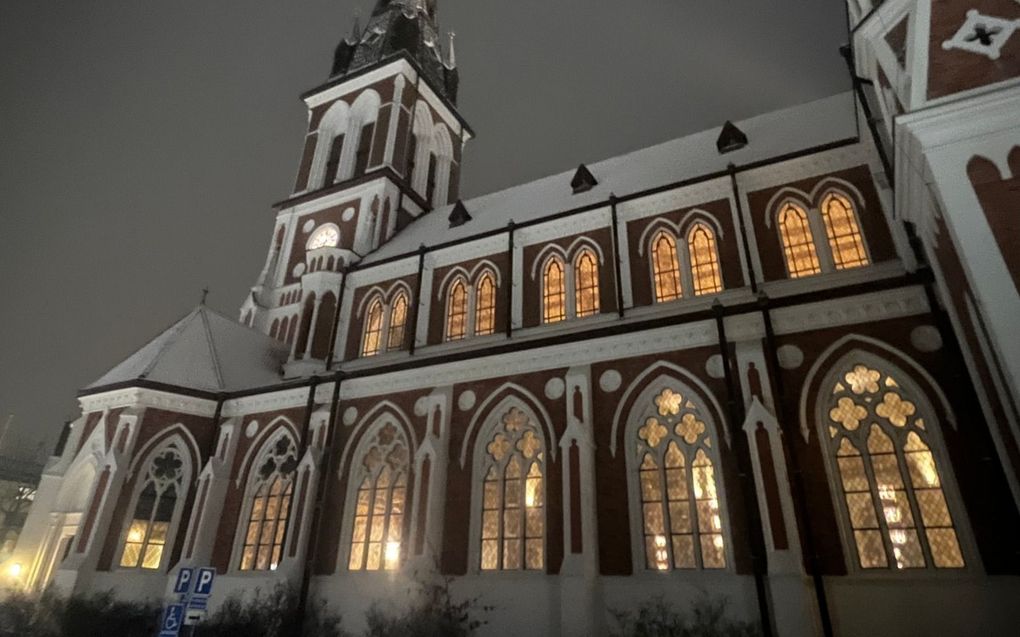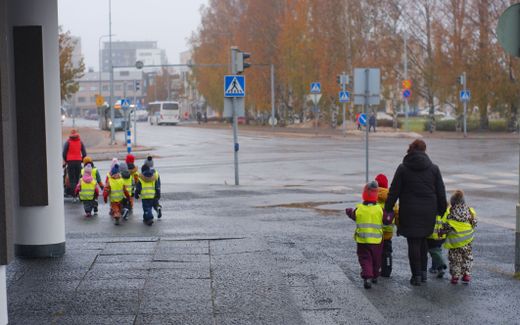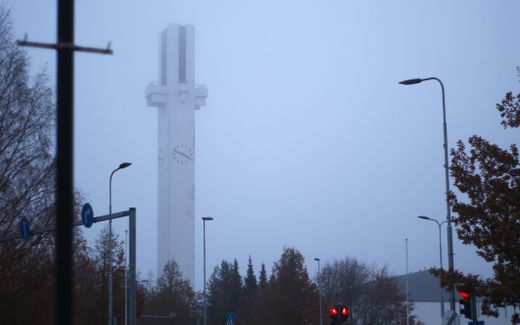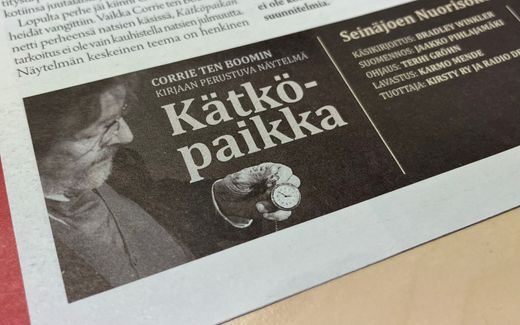Biblebelt feature: Jönköping is no less than the Swedish Jerusalem (1/3)
29-01-2024
Northern Europe
Wim Hulsman, RD

The Sofia church Jönköping was covered by a beautiful layer of snow. Photo RD
Northern Europe
Jönköping has been called the "Jerusalem of Sweden". The city and the surrounding area counted many churches. And still, some churches receive hundreds of visitors per service every Sunday in otherwise mostly secular Sweden.
The town on Lake Vättern is white with snow. It gets dim early. Then the lights turn on at the stately Sofia Church, the city's main church. It is the most prominent place of worship in the regional city, with some 85,000 inhabitants. Sofia is where the large Lutheran congregation, part of the Church of Sweden, meets.
Part 2 of a series of European Biblebelts
More houses of worship can be found in the streets around Sofia Church. Like the strikingly soft-pink painted Immanuel Church. This is home to the congregation of pastor Daniel Wranhult. With a handshake, the pastor greets visitors. He himself is busy, but hostess Evan Karlsson, over a cup of coffee, tells more about the congregation and how the church became her second "home". Here, she learns "how to shape a living faith", she says. The large church hall is coloured brown with all the wood. The roughly 400 to 500 congregants can fit in well on Sundays.
The church is open all week. In the church's Immanuel Café, anyone can buy coffee or tea with something to go with it. Cosy seating invites you to do so. "Soon, there will be a service where the Lord's Supper is administered," Karlsson explains. "Afterwards, we will eat soup and bread together here."
The place of worship is also used for Bible classes, funerals and musical gatherings. The Immanuel Church is part of the Equmeniakyrkan. The church was formed in 2013 when groups of Lutheran, Methodist and Baptist churches continued together.
Bookshop
A little further down Oxtorgsgatan ("gatan" means street) the large Christian bookshop Nya Musik is located. Right after opening at ten o'clock, it is already busy this Wednesday. Inside, it is pleasantly warm for the visitors, who stamp the fresh snow off their footwear as they enter. "This is one of three Christian bookstores in the whole of Sweden," says employee Helena Granno. "For us, the webshop, in particular, is very important."

The shelves are filled with Bibles, theological books, Bible commentaries, and contemplative books. Still, the children's book corner is also large. Furthermore, many figurines of angels, crosses, and Christian greeting cards. There is also a music section. Which Swedish Christian author is the most read? "Thomas Sjördin's books are doing very well. He lost two sons and writes about that. That touches people."
Sjördin is a pastor in a large Pentecostal church in the port city of Gothenburg. He is also a columnist in a large, secular Swedish newspaper. "Sjördin knows how to reach a wide audience," says Granno. Some of his books have also been translated into other languages.
Furthermore, Peter Hallbert is popular, says Granno, as she shows some of the authors' titles. Foreign authors such as C.S. Lewis and Tim Keller are also there, translated into Swedish.
Recognition
Just down a side street, on Klostergatan, is the small Bibel Baptistförsamlingen. The Bible-believing congregation meets in a simple room that probably used to serve as a shop. There, churchgoers hear that they are sinners and can only be saved by grace and faith, reports the information. It is one of many small churches in the city.
But there are also congregations of larger size. Less than a five-minute walk away on Lagermansgatan, for example, is the city's largest church: the Jönköpings pingstkyrka, a Pentecostal congregation. There is a cosy coffee and lunch corner here, too. A hostess at the counter welcomes visitors kindly. Marcus Ardenfors approaches from one of the corridors. He is the congregation's leading pastor. He tries to make the church visible in the city and its surroundings. A difficult task, but there is a bit more recognition again of the significance of churches in society, says Ardenfors.
Schools
The Jönköping region is also home to a number of Christian schools. Just outside the city, for example, is the Christian Strandskola. Children at this primary school receive education from the Bible there. From the government, there is a strict policy: all schools must offer neutral education. However, free schools are given room to add education based on the Bible. Such free schools exist for both primary and secondary education.
A Christian college, the Södra Vätterbygdens Folkhögskola (Svf), resides on a hill on the edge of Jönköping's city centre. From the campus grounds, the 300 students and 55 staff have a great view of the city and the large lake. The campus also contains several residential buildings for the students. They come from much of southern Sweden.
Hill
The school was founded in 1919 by the local churches, rector Anders Georgsson enthuses. "The churches felt the need to work on a higher level of education among the population. They, therefore, started a folk high school. The school was paid for by the churches, which set up a fundraising campaign. At first, the school was housed in the city, but since 1930, it has been here on the hill." Today, by the way, the school is also funded by the government.

From the beginning, the school offered various courses: music, communication, and art. "In the beginning, there was also a housekeeping school," he says.
The Svf is now associated with the Equmenia Church (founded in 2011) and its youth organisation Equmenia, but anyone is welcome, Georgsson stressed.
Psalms
The Svf also has a theology course, where Anders Linsmo is in charge. Previously a pastor, he is now a full-time lecturer. He teaches the Old Testament. Linsmo: "I am now going over the histories of David and Saul in combination with the Psalms."
The students learn to lead youth work but also have to produce a sermon. "They then deliver that in one of the churches around here," he says. Preachers the Svf does not train. "For that, students have to go on to university. Every year, there are one or two students who choose that."
This article was translated by CNE.news and published by the Dutch daily Reformatorisch Dagblad on January 25, 2024
Related Articles








